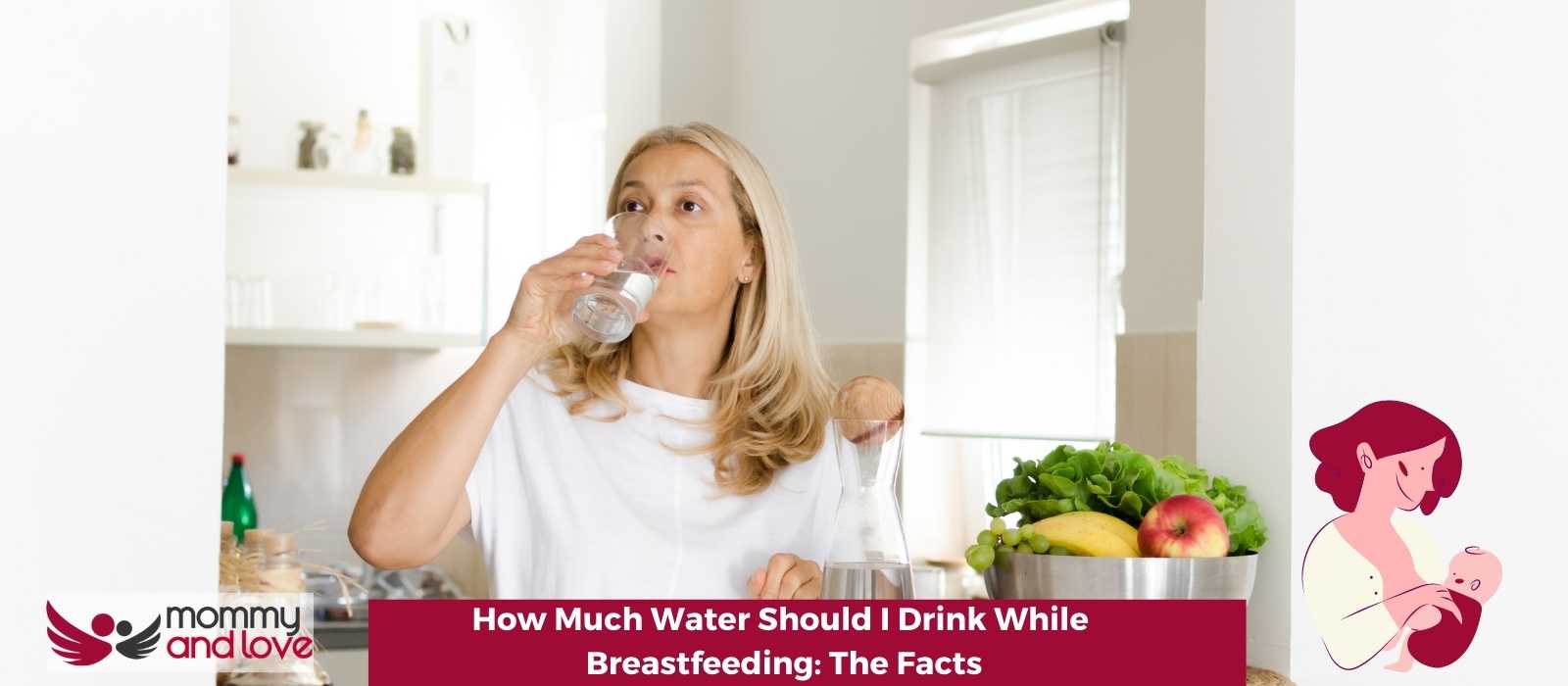Water is an essential part of life, and it is especially important when you are breastfeeding. It is crucial to stay properly hydrated while nursing in order to keep both you and your baby healthy.
In this article, we will discuss how much water you should drink each day while breastfeeding, as well as some tips on how to stay well-hydrated. Let’s get started!
How Much Water Should Breastfeeding Moms Drink?

The amount of water you need to drink while breastfeeding depends on a few factors, including how much water you were taking before you became pregnant, your activity level, and the weather.
Most doctors and lactation consultants recommend that breastfeeding mothers drink 16 cups (128 ounces) of fluids per day or drink half of their weight in ounces. However, as a general rule and some women may need more or less water depending on their individual circumstances.
If you’re wondering how much water you should be drinking while breastfeeding, it’s a good idea to start by looking at your pre-pregnancy water intake. If you were already taking eight glasses of water per day before you became pregnant, then you should continue to drink that same amount while breastfeeding.
Your activity level also plays a role in how much water you need to drink while breastfeeding. If you’re a more active person, you’ll need to drink more water than someone who is less active. And if you live in a hot climate, you’ll need to drink even more water.
Finally, it’s important to listen to your body and drink when you’re thirsty. If you’re feeling thirsty, that’s a sign that your body needs more liquids. So don’t wait until you’re thirsty to drink water, make sure to sip on water throughout the day.
Why Is Drinking Enough Water While Breastfeeding Important?
As a new mom, you’re probably already well aware of the importance of staying hydrated. But did you know that it’s just as important to drink enough water while breastfeeding?
It’s very important to drink enough water while nursing because even being slightly dehydrated can decrease your milk supply. It’s important to have the right amount of hydration so you can continue to provide enough milk for your baby and feel energized when you breastfeed.
Dehydration can cause a decrease in milk production, so it’s important to make sure you’re getting enough water throughout the day. Consuming plenty of water and staying hydrated will help you to produce more milk and keep your supply up.
If you’re not getting enough water, you may notice that your baby is fussier than usual or that you have less milk when pumping. If you’re experiencing these symptoms, make sure to increase your water intake and see if it makes a difference.
Remember, every breastfeeding mom and baby is different so what works for one may not work for another. Just try your best to drink plenty of fluids and stay hydrated throughout the day.
Not only does plenty of water help to prevent muscle cramps and chapped lips, but it can also help maintain skin health. So make sure to keep a water bottle handy and drink up!
What Are the Signs of Dehydration?

If you’re well-hydrated, your urine should be pale yellow to clear. However, if you’re dehydrated, your urine will likely be dark yellow or even orange.
This is because your body is trying to hold on to as much water as possible, and so it doesn’t want to waste any by excreting urine.
Dehydration can also cause your skin to lose its elasticity. To check for this, pinch a small section of skin on the back of your hand. If it takes a long time for the skin to return to its normal position, you may be dehydrated.
Another sign of dehydration is sunken eyes. When you’re properly hydrated, your eyes should appear moist and healthy. But when you’re dehydrated, your eyes may look sunken and dark circles may form under them.
If you’re experiencing any of these signs, it’s important to rehydrate as soon as possible. Drink plenty of liquids, preferably water or fruit juice. Eat foods that have high water content as well.
And if you’re feeling especially dehydrated, consider sports drinks or oral rehydration solutions, which can help replenish your body’s electrolytes.
Dehydration is no joke, so if you’re experiencing any of these signs, be sure to take action immediately. Drink up and stay healthy!
If you’re a pregnant mom who is struggling with keeping hydration, you can always talk to a Lamaze certified childbirth educator or doctor to get professional medical advice. It’s vital for new moms to eat a healthy diet.
Does Drinking More Water Increase Breast Milk?
If you’re wondering whether or not drinking more water will increase your breast milk production, the answer is no. Excessive amounts of water don’t affect breast milk production. In fact, too much water can actually be counterproductive.
Your body is very good at regulating its own fluid levels. It expels excess water to restore electrolyte balance. So, as long as you’re drinking enough to quench your thirst and stay hydrated, you’re probably doing just fine. There’s no need to go overboard.
Of course, every mom is different. If you feel like you’re not producing enough milk, or if your baby seems fussy or dehydrated, it’s always a good idea to consult with your pediatrician or a lactation consultant. They can help you figure out if there’s anything else you can do to increase your milk supply.
But in general, just drink when you feel thirsty and don’t worry about trying to chug extra water in an effort to boost your breast milk production. Your body will take care of that all on its own.
How to Stay Hydrated While Breastfeeding?
It’s important to drink the right amount of fluids while nursing. A nursing mom’s body needs extra water to make breast milk.
To make sure you’re getting enough, carry a water bottle with you and take sips often. Drinking water will also help you avoid getting dehydrated, which can lead to fatigue and other health problems.
In addition to water, you can also drink other liquids like milk, juice, and herbal tea. Just be sure to avoid caffeine, which can dry out your breast milk.
If you’re having trouble getting the right amount of liquids during the day, try drinking a glass of water before bed and first thing in the morning. You can also keep a pitcher of water next to your bed so you can easily grab a glass during the night.
Drink water to stay properly hydrated is important for both you and your baby, so make it a priority. With a little effort, you can make sure you’re getting enough liquids to keep both of you healthy and happy.
Here are a few additional tips:
- Avoid soda and caffeinated drinks. They are diuretics and can cause a dehydrating effect on your body.
- Avoid alcohol in excess. The occasional glass of alcohol every once in a while won’t hurt. But excessive consumption of alcohol can cause problems.
- Limit your sugar intake. Sugar can hamper water absorption in the body.
- Eat foods and fruits with high water content such as watermelon and cucumbers.
- Add lemon to your water for it to have a refreshing taste.
- In today’s digital age, you can use a hydration app to keep track of your fluid intake.
- If you notice the color of your urine is a shade darker, drink some extra fluid.
What Happens if You Don’t Drink Enough Water While Breastfeeding?
If you’re not careful, dehydration can set in and that can lead to a decrease in milk supply. Not drinking enough water can also cause constipation. Dehydration happens when your body doesn’t have enough fluids to function properly.
When you’re breastfeeding, you lose a lot of fluids and if you don’t replace them, you can become dehydrated. dehydration can cause a decrease in milk supply because it decreases the number of fluids available to your body to make milk.
When you’re constipated, it means that you have a hard, dry stool that is difficult to pass. This can be uncomfortable and can also lead to dehydration.
Drinking enough water can help to prevent constipation and dehydration.
Conclusion
So, how much water should I drink while breastfeeding? Generally, you want to drink at least drink 16 cups (128 ounces) of fluids per day.
Drinking enough fluids, especially water, is crucial for both you and your baby when breastfeeding. It’s important to stay properly hydrated in order to maintain milk supply and avoid health problems.
Dehydration can be dangerous for both mother and child, so it’s important to take steps to prevent it from happening. Drink plenty of fluids throughout the day.

This article was written by Sandra Baker – full time writer and the mother of four amazing kids (including twins!)
She’s also a breastfeeding counselor and has spent years helping new parents learn how to care for their children. When she’s not writing or caring for her children, Sandra likes to spend time reading and taking walks with her husband.




